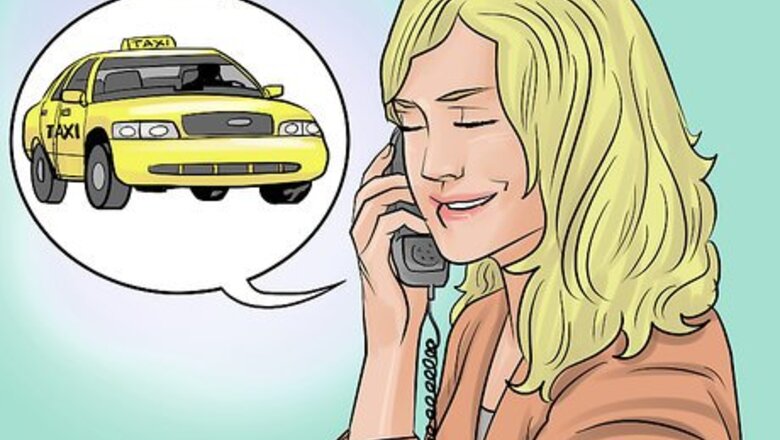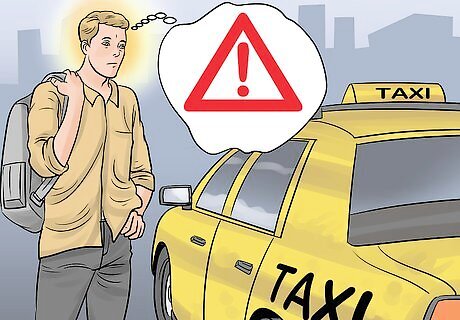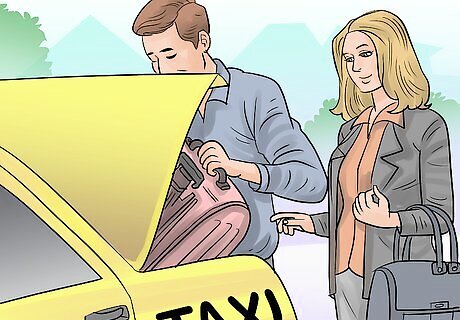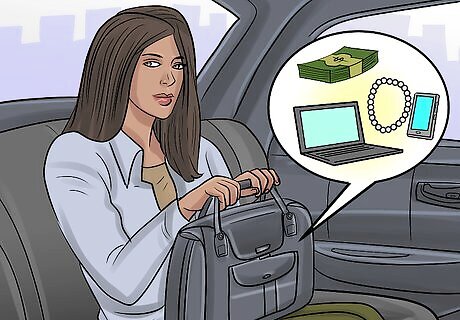
views
X
Research source
Choosing Your Taxi

Book your cab in advance. Generally speaking, you'll be safer if you plan your trips ahead of time and call and schedule a cab to pick you up at a set time rather than hailing a cab on the street. This is particularly important if you are a woman or if you are young. Licensed taxi services have dispatch numbers you can call to schedule your cab in advance. Ask the operator for the name or car number of the car that is scheduled to pick you up. This is especially important at airports, where there often are unlicensed cabs waiting outside to pick up desperate travelers. You might also give your destination to the operator and ask about fares and traditional tips so you can get a reliable estimate of how much your trip will cost. When the cab arrives, make sure it is the car you ordered.

Use caution when calling in public. If you're out in public and need to call a cab to come and pick you up, try to make your call from a relatively private place to avoid being overheard. Someone might overhear you and take advantage of the situation. For example, someone who works for an unscrupulous or illegal taxi service could call a car to come pick you up. You could mistakenly get into that car, thinking it was the one you just called. Generally, avoid talking on the phone on a busy sidewalk. This not only increases the odds that you could be picked up by an illegal taxi, but also makes you vulnerable to muggers because you are distracted.

Confirm prices in advance. When you call ahead to order your taxi, make sure you understand how much the trip will cost, whether you'll pay a metered fare or a flat rate, and what tip is customary in the area where you're traveling. Once you enter the cab, explain to the driver that you already know how much the trip will cost. For example, if the taxi company charges a flat rate for trips to the airport, let the cab driver know that you're expecting that flat rate and not a metered fare. If the driver disagrees or insists on charging you something different than what you were told in advance, get out of the car and call the taxi service immediately to report the discrepancy.

Check for a badge. In most countries, taxi cab drivers must have a badge or identification card in their car and available for your inspection. Look at it carefully and, if there's a photo, compare that photo to the driver to make sure it is the same person. If the badge looks damaged, or as though it has been tampered with, get out of the cab and call the taxi service immediately. While there may be no issue, you are better safe than sorry. The badge could have been stolen by an imposter who is posing as a legitimate cab driver. A legitimate cab driver should have no qualms about showing you their identification. If they refuse to do so, get out of the cab and call the taxi service immediately.

Visually inspect the car. Most countries, particularly in North America and Europe, require licensed cab drivers to keep their cars in good condition with routine maintenance up to date. If the cab looks beat-up or doesn't run properly, it may not be legitimate. Keep in mind that if something turns you off or just doesn't "feel right" about the cab itself, or the driver, you don't have to get into the car. Simply call the taxi service and tell them that you had a bad feeling, or otherwise explain your concerns. If you're embarrassed to do this, you might want to call a different cab company. In less developed countries, taxis may not be as well maintained as they are in North America and Europe. Take some time to look around the area and get a feel for the average condition of cabs so you know what to expect.

Refuse to share a cab with a stranger. Ride-sharing can save you some money, but to stay safe when traveling by taxi you need to make sure no one that you don't know gets into the cab with you. A stranger could put your safety and security at risk. Sometimes this is a ploy between an unscrupulous cab driver and a friend to rob or assault passengers. You get in the car, then the other person gets in the car. When you are robbed, the cab driver and the other person split the loot. If you've gone out at night, you may meet somebody who offers to share a cab with you, saying they are staying in the same hotel as you are, or that they live close by and you would be going in the same direction. This too can be a ploy to rob, assault, or otherwise take advantage of you. Don't do it. Your safety is worth spending a little more for your ride.
Securing Your Belongings

Keep your things close by. When you're riding in a taxi, the further away from you your belongings are, the more likely they are to get lost or stolen. If you have a large suitcase it might not be possible to keep it with you, but try to place it somewhere in the cab where you can keep an eye on it. If the cab has a trunk that locks, ask to put your suitcase there. Watch the cab driver place your suitcase in the trunk and make sure that the trunk door is closed completely before you get in the car. Don't part with smaller bags, backpacks, or purses – especially if they have your wallet or cash inside them. The best place for these items is on the floor between your feet. For additional security, you can loop the strap around your leg. Don't allow your belongings to be stowed on the exterior of the cab, such as on an overhead rack, as they can easily be stolen.

Hide electronics and expensive items. If you are carrying items such as your mobile phone, a tablet, or a laptop computer, make sure they are well hidden before you get into the cab, and keep them out of sight the entire trip. You may not think of these things as all that valuable or expensive, especially if they are commonplace in your home country, but they make you a target for thieves. If at all possible, transfer such items to a bag you will keep with you, if you are carrying them in a larger suitcase that must be stored in the trunk.

Sit in the middle of the backseat. In the middle of the backseat you are less vulnerable to passers-by who might mug or assault you. This also keeps your belongings, which you have on the floor between your feet, out of arm's reach. No matter how tempting it might be, keep your windows rolled up at all times. This may mean the cab becomes stuffy or overheated, but with the windows down someone can easily reach in and assault or rob you. These precautions are particularly important if you are a woman who is traveling alone. Almost anywhere in the world, a woman traveling alone is vulnerable to opportunistic criminals.

Have your keys ready. When you get out of the cab, you don't want to be fumbling for your keys or anything else you might need at your destination. Having everything ready to go makes you less vulnerable to street crime. Being organized and ready also shows that you are confident and in control. This makes you less likely to be targeted for an attack. Keys threaded between your fingers also can be used for self-defense in the event you are assaulted or approached in a way that makes you uncomfortable.
Staying Alert

Review maps of the area. If you're completely unfamiliar with an area, you're more likely to be taken advantage of. This can impact your safety as well as costing you more money than you anticipated. For example, if the taxi driver knows that you don't know anything about the area, they may take you on a long, meandering route to run up the fare. However, in most countries if you give the driver a specific route they must follow it. If the taxi driver goes in the wrong direction, or tries to take you on a different route or argue about which way to go, thank them for their time and exit the cab immediately.

Let someone know you are traveling. Maintain your safety by ensuring that someone else knows when you are getting in the cab and approximately how long your trip will take – even if that person isn't local. If someone knows you're in a cab, they'll know that if they don't hear from you within a certain amount of time that something might have happened to you. They can take steps to call the appropriate authorities. If you are meeting someone at your destination, call or text them when you leave so they know when to expect you and can take action if you don't show up on time.

Avoid traveling alone if intoxicated. When you are intoxicated, you are vulnerable – especially if you are in a strange location far from home. This vulnerability is intensified if you're traveling in an area where you aren't fluent in the local language. Protect yourself by not consuming alcohol if you are traveling alone, unless you are in your hotel or other protected place and won't need go anywhere. If you do have alcohol – say, a couple of glasses of wine at dinner – drink a cup of coffee to sober up a little before your taxi arrives. Don't tell the cab driver that you've been drinking.

Keep conversation strictly professional. Women in particular should avoid any sort of personal conversation with the cab driver. It can be difficult, particularly if you're on a long ride, not to engage in small talk. However, you will be safer the less the cab driver knows about you personally. If the cab driver asks you personal questions, you can simply say "I don't feel comfortable talking about that." Remember that you are under no obligation to talk to your cab driver. You also can tell the cab driver initially that you are not interested in carrying on a conversation. Tell them that you've had a long day and you simply want silence.

Pay attention to local currency. Unscrupulous cab drivers who've pegged you for a foreigner may attempt to pass off counterfeit or out-of-date currency as the real thing when giving you your change. Learn about the local currency before you travel to an area, and know what to look for. If the cab driver gives you currency that you suspect is fake, ask them to exchange the bills. If they refuse, call the cab service immediately.

Be familiar with emergency numbers. If you're traveling in a foreign country, make sure you know what number to call if the cab ride takes a turn for the worse and you need assistance from law enforcement. Ideally, you should program this number in your phone so you can call it as quickly as possible if the need arises.

Keep your phone close at hand. While you should take care to hide expensive electronics, your phone also is a safety line. If trouble arises or you sense danger, you need to be able to get to your phone quickly. If you have your phone in your hand, keep it lowered at lap level so no one on the street can see it. Don't put your phone in your back pocket so that you're sitting on it. This can make it difficult to get out in an emergency situation. If your phone is in a front pocket, make sure the pocket is deep enough that your phone won't slip out when you sit down.




















Comments
0 comment